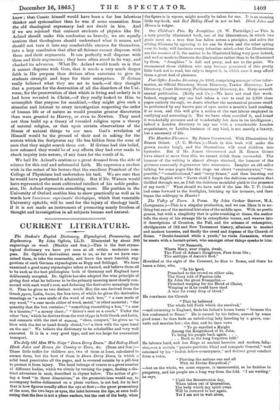CURRENT LITERATURE.
The Student's English Dictionary, Etymological, Pronouncing, and Explanatory. By John Ogilvie, LL.D. Illustrated by about 300 engravings on wood. (Blackie and Son.)—This is the best etymo- logical dictionary we have yet seen at all within moderate com- pass. Dr. Ogilvie's derivations seem to us, so far as we have exa- mined them, to take the reasonable, and leave the more fanciful, sug- gestions of such German etymologists as Bopp and Schlegel. We have examined a good many etymologies taken at hazard, and believe them all to be such as the best philologists both of Germany and England have deliberately accepted. Dr. Ogilvie has also adopted the wise principle of giving first what he believes to be the primary meaning most closely con- nected with each word's root, and deducing the derivative meanings from it. Thus he gives us two distinct words Box, the one derived from the Greek pyxos, Latin, buses, the box-tree, of which he gives the derivative meanings as "a case made of the wood of such tree," "a case made of any wood," "a case made either of wood, metal," or other material ; "the quantity that the box contains;" "something resembling a box," "a seat in a theatre ;" "a money chest ;" "driver's seat on a coach." Under the other 'box,' which he derives from the root of pyr in both Greek and Latin, and connects with the root of croxy06., "close, compact," he gives us "a blow with the fist or hand firmly closed,"—" a blow with the open hand on the ear." We believe the dictionary to be scholarlike and very well executed. It is in a very good type, and not too large for convenient transport.


































 Previous page
Previous page